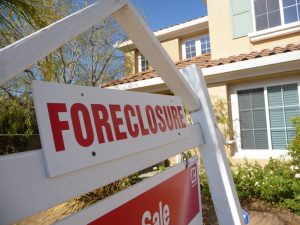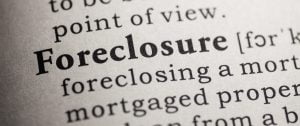2023 Guide To The Foreclosure Process in New York
Go Back To Previous PageIn real estate, foreclosure occurs when a borrower cannot repay his mortgage. While a foreclosure can lead to the borrower losing his house, that’s not always the case. The lender must strictly follow state law on foreclosure proceedings to foreclose on the borrower’s home. If the lender violates the law, this provides grounds for the borrower to stop the foreclosure process in New York. In New York State, courts allow borrowers to make payments after default.
house, that’s not always the case. The lender must strictly follow state law on foreclosure proceedings to foreclose on the borrower’s home. If the lender violates the law, this provides grounds for the borrower to stop the foreclosure process in New York. In New York State, courts allow borrowers to make payments after default.
The borrower can supply an “Answer” to the court, revealing how the lender may have proceeded illegally by taking advantage of him. In this way, the courts favor borrowers. We will discuss the foreclosure process timeline in detail.
The foreclosure process in New York also favors borrowers in another way. Since foreclosure is time-intensive in New York, it can take three to 5 years to finalize. The borrower can live in their contested house without paying the mortgage and taxes for several years. We’ve put together a complete guide to the foreclosure process in New York.
What is a Foreclosure Process?
A mortgage lender or servicer files a foreclosure lawsuit against a borrower. The foreclosure happens after you miss at least one and up to three mortgage payments on your home. The case will occur in court if a borrower fails to make payments in New York. This can end with the borrower losing his home to the lender through a public auction.
The foreclosure is not just for mortgage payments. Foreclosing can result if you fail to pay home equity loans or unpaid property taxes. Particularly in New York, you have a 15-day grace period if you fail to make a payment.
The lender will not charge late fees or initiate legal action. However, after 15 days or more, your lender will begin to charge late fees (around 2% of the overdue payment).
New York is a Judicial Foreclosure State
New York is a judicial state, meaning the lender can’t foreclose on your home without filing a lawsuit. In contrast, there’s also a non-judicial foreclosure state. This means mortgage lenders don’t need to sue the borrower and go through a court process to foreclose on your home. For example, California and Texas are non-judicial states.
foreclosure state. This means mortgage lenders don’t need to sue the borrower and go through a court process to foreclose on your home. For example, California and Texas are non-judicial states.
What to point out is that the judicial foreclosure process is lengthier in time than a non-judicial state, and the length works in your favor and allows you to stay longer in your home. Therefore, the court is almost always on the borrower’s side in New York.
The court will usually protect your rights as a property owner, but this can make the case lengthier. This is another way for the borrower to prolong his stay in the contested home.
If you need more time to come current, you can hire an attorney who will seek a temporary suspension during this period.
Foreclosure timeline
-
Delinquent: First Missed Payment
You start receiving notices from the lender within 30 days from the first missed payment notifying you to remain current.
-
Default
You’re considered in default once you miss three to four consecutive mortgage payments. In some states, you’re considered in default if your income is 30 days late. The lender will send you another notice stipulating that you must pay the outstanding balance up to the present of the loan.
The default impacts your credit score. So even if you wanted to cure by borrowing equity against your home, your new low credit score might make it hard or impossible to secure the loan.
-
Loss Mitigation Options in a Foreclosure Process in New York
A Loss mitigation option refers to the lender’s steps to work with the borrower to avoid foreclosure. No later than 36 days after you miss a payment, the lender will contact you to settle the matter. The lender will offer loss mitigation options, like a loan modification, forbearance, or repayment plan.
If you fail to respond or remedy the matter, the lender will contact you within another 36 days.
To avoid foreclosure, no later than 45 days after missing a payment, the lender will again inform you about loss mitigation options. The lender appoints you with a servicer to possibly discuss your situation, and this appointment is also to avoid foreclosure.
Then, the lender may back off for a short window to learn if you have any financial situations working against you that prompted the missed payments. These can represent a loss of a job, a reduction in income, and significant expenses such as renovation.
-
The “Pre-Foreclosure”
Default letter or pre-foreclosure notice
After 90 days and up to 120 days after you have missed three or more payments and have not settled on the amount you owe, like using a payment plan, then the lender will send you a notice of default or a pre-foreclosure notice informing you that you have 90 days before the lender starts foreclosure proceedings.
The Pre-foreclosure stage is when you fail to make payments before a foreclosure officially begins.
The lender doesn’t want to foreclose on your home, as it is its investment. Therefore, banks will include information about how to remedy the default in the pre-foreclosure notice. The lender comprises a few government-approved housing counselors near your area who provide free or low-income housing.
If the borrower doesn’t have the money to pay back the missing amount and wants to keep the house, this is the time you should work with your lender to find an alternative to foreclosure. Then, the borrower can refinance his mortgage with another lender, apply for a loan modification, and even contest the foreclosure.
Short sale option in a Foreclosure Process in New York
The borrower can sell the house using a short sale. This is when the borrower sells his property at fair market value. Therefore, the borrower will not make a profit as the sale will be less than the loan itself. The lender, in turn, will have no choice but to settle the matter for less than the entire balance.
Suppose the lender starts foreclosure proceedings but fails to send you the 90-day notice required by law or fails to send you other messages. In that case, you have a rare instance of a defense strategy that could lead to a complete dismissal of the foreclosure.
-
The Breach Letter: What is it?
Mortgages in New York require the lender to send a notice or a “breach letter” informing the borrower that the loan defaulted. Before the lender can accelerate the loan and proceed with foreclosure, this letter allows you to cure the default again. To avoid foreclosure, the breach letter will give you a date by which you must fix the default. “Accelerating the loan” allows the lender to demand that the borrower repay the loan balance.
-
Is the “Lis Pendens” the First Step to Foreclosure?
Foreclosure begins with the lender filing the “lis pendens” on the home. The “lis pendens” is the first step to foreclosure and a pending lawsuit. The document is filed with the county clerk’s office only after the borrower has missed three payments. This lis pendens makes the judgment public.
So anyone interested in your house can look it up in public records to see if there’s a lis pendens.
After filing a lis pendens, your lender must notify you that a court lawsuit will contest your house’s ownership. The letter, which includes your court date, is called a “summons and complaint” notice.
What are the Summons and Complaint Notices?
The lender’s notice also serves the court and explains why the lender is filing. This will state that the borrower has failed to pay the loan. The lender intends to foreclose on your home so the lender can collect payments. The court needs proof that the lender delivered you the summons and complaint notice.
You have 20 days to respond if the notice was delivered in person or 30 days if sent by mail.
If you respond promptly, you must file “an Answer” to the summons and complaint. An Answer is a written response from you to the lender. In this document, you must explain to the court why your lender does not have the right to foreclose. This is your chance to defend against foreclosure in court.
Your Answer should narrate your side, i.e., your defenses to the claim as to why you have not made payments (i.e., you lost your job) and any claims against the lender, such as predatory tactics that the lender may practice and which we’ll explain below. Therefore, if you file an answer on time, this is the best way you can fight mortgage foreclosure.
If you don’t respond to the summons or fail to appear in court, the court may favor the lender. If this happens, foreclosure on your property will proceed.
The Mandatory Settlement Conference in a Foreclosure Process
Courts in New York are more liberal compared to other states. They will allow a borrower who just lost his job and has no income to keep returning to court even though the courts know that you purposely delay the foreclosure process.
The lender must also request intervention during the summons and complaint notice. The goal is to schedule a mandatory foreclosure settlement conference to bring the lender or servicer and the borrower together to work on a solution.
If the borrower attends the settlement conference and answers basic questions, he will have another 30 days to file his Answer. If the borrower has not filed an answer, the court will grant you 30 days to answer the summons and complaint.
The worst thing a borrower can do is ignore the lender. The borrower who fails to respond with Answers is doing himself a disservice. Many mortgage lenders usually accept to work with the borrower to receive as much money as he can afford. A lender may modify your monthly obligations to enable you to pay over time.
Discontinuation” of the lis pendens
But if the settlement conference is amicable and you can agree with the lender, the foreclosure will terminate via the “official discontinuation” of the lis pendens. The lender has up to 150 days after the settlement conference to discontinue the foreclosure.
The mandatory settlement conference can be extended if the borrower returns and cannot agree with the servicer or lender. It’s not unheard of that a borrower can go back 10 or 11 times, which works in the borrower’s favor as he will keep living in the house for an extended period.
While we continue to emphasize that courts in New York are very liberal, the judge may still be on the lender’s side and will schedule a foreclosure sale on behalf of the lender.
The time from the first missed payment to the scheduling of the auction sale will represent at least four months after the ruling. That’s more months that a borrower can stay in the house until the auction. Then, a notice of the sale is published in a newspaper once a week for at least four consecutive weeks before the auction.
The lender will not give you advance notice of the auction date, and legally, the lender isn’t required to provide any information.
The Foreclosure Sale
After the home is sold at auction, the highest bidder will put down 10% of the bid price and come up with the remainder due within 30 days. Suppose the winning bidder offers more than your debt, and the sale results in excess proceeds. In that case, the borrower is entitled to that extra money. Excess proceeds are money above what’s needed to pay off all the liens on the borrower’s property.
Statutory right of redemption
Then, the property’s title is transferred to the new owner. In some states, borrowers have a redemption period after the foreclosure sale, during which they can buy back the home. In New York, however, the borrower legally can’t repurchase the house after the sale, called the “statutory right of redemption.”
What Happens if a Borrower Fails to Leave the House After Its Sale?
After your legal right to live in the house ends, the borrower will not freely or voluntarily leave on many occasions. The borrower has even more time to remain home during this period despite working against the law.
Evicting the borrower from the house remains a costly and time-consuming endeavor. The only way to make the borrower leave is to offer financial compensation for moving out peacefully and voluntarily. We call this a “cash-for-keys” deal.
Cash-for-keys
The cash-for-keys deal involves the bank offering you money. The bank may provide you with a few hundred dollars or even thousands in exchange for leaving your home by a specific deadline.
However, this is contingent on the borrower vacating the house in good condition. If you feel slighted or scorned, you may permanently damage the home. If you don’t wreck the house, clean and spruce it up, and haven’t vandalized appliances or light fixtures, to name a few, you may receive the money. But before that, you must agree to do a home inspection.
What is a Deficiency?
The sale price of the foreclosed property will usually be lower than the total debt owed by the borrower. This is called a “deficiency.” In most cases, the borrower must pay the remaining funds in the deficiency. Once again, the highly liberal courts in New York will allow for an impaired judgment, whereby the house’s value is estimated to lower the debt owed to the lender.
If the deficiency judgment doesn’t occur, the borrower must pay the funds owed in the deficiency. To ensure you pay, your mortgage lender will often garnish your wages, among other methods.
What Happens Before Trial in a Foreclosure Process in New York?
The Summary Judgment
Before trial, the lender’s motion for summary judgment occurs when the lender asks the court to side with him and throw out a trial. The court must show in court that both the lender and the borrower have agreed to the facts related to the foreclosure to decide in favor of the lender.
If you can’t devise a compromise with your lender at the settlement conference, the case will go to court. But before the lender asks the court to rule in their favor, the lender will want to speed up the foreclosure if there’s a lack of defense on the borrower’s part. Another cause is a lack of proof that the lender has engaged in unlawful lending practices that fostered the default.
When the court approves this summary judgment, you’ll lose the case. If the court doesn’t support it, your case goes to trial. The borrower must be ready for foreclosure proceedings if you lose the trial.
Your Response to Motion for Summary Judgment
To file an answer to the motion for summary judgment, you must include documentation that supports your defense. If the borrower doesn’t file an answer, then the lender will win by default. During the motion for summary judgment, the court reviews the lender’s motion and your response to see if you have any legal rights for the foreclosure to proceed. The court usually decides to hold a hearing to make a decision.
Your response should include “defenses,” which explain why the foreclosure should not proceed. It would help if you also made a “counterclaim,” which is your formal complaint against your bank, arguing that your bank’s actions may have violated any laws.
If the court finds that you don’t have legal defenses, the court will decide on the summary judgment in favor of the lender. This is terrible news for the borrower because the lender has the legal right to foreclose on your house. But if the borrower does have legal defenses against foreclosure, the court will take your side and deny the summary judgment to the lender.
Predatory lending
The defenses usually involved uncovering predatory lending when you agreed to the mortgage loan terms. Predatory lending is when a lender engages in deceiving practices with the borrower.
The lender often targets the vulnerable and uneducated, i.e., those who don’t know how a mortgage works. The lender also targets older people and marginalized groups. They target people who have difficulty securing a mortgage until a lender comes along and gives them unfair lending terms.
Here are a few more examples of predatory lending.
- Say a borrower’s income is only $1,200 a month. The lender sold the borrower a loan with monthly payments of $1,200.
- Or the lender tells the borrower that he doesn’t qualify for a fixed-rate mortgage and then offers an adjustable-rate mortgage. This means the borrower can refinance the loan on better terms in a few years, which never happens.
- When the borrower claims any loan is based on the value of his house instead of on his ability to repay the loan
How Predatory Lending Can Save Your House
In New York, predatory lending can represent your defense if the lender is revealed to have engaged in such unlawful practices. Once this is questioned, a judge will throw out your foreclosing proceedings and void your mortgage note. The lender will have no right to collect any charges for the loan. Also, you may collect any payments made on the house.
How Long Does the Foreclosure Process Take in New York?
In New York, the proceedings can take 3 to 5 years on average when the foreclosure is contested. Again, if the borrower fails to answer and his response goes unchallenged, the foreclosure process in New York will accelerate and take as little as 6 or 7 months. This is considered very fast for New York, among other states.
If the foreclosure process in New York takes over six years, one bright note for the borrower is that he can keep the house for free. A contested foreclosure is expensive for a lender. The lender must pay the monthly mortgage and other fees while the borrower does not pay.
Will Foreclosure Hurt My Credit Score?
If you foreclose on your home, your credit score will drop very low, sometimes 100 points or more. The foreclosure will remain on your credit report for seven years. But your missed payments will hurt your credit score even before the foreclosure.
Has New York Postponed Foreclosure Process During the Pandemic?
We told you that New York law and its courts are on your side, and this is more emphatic now due to the coronavirus. In 2020, Governor Cuomo signed the COVID-19 Emergency Eviction and Foreclosure Prevention Act. This law prevents residential evictions, foreclosure proceedings, credit discrimination, and adverse credit reporting related to COVID-19.
Residential Foreclosure Proceedings
The Act also places a moratorium on residential foreclosure proceedings. This is for homeowners who can no longer pay their mortgage loans due to the pandemic. Homeowners must show they are having trouble. They must sign and send a hardship declaration form to their mortgage lender.
Also, $20 million was set aside for the Homeowner Protection Program (HOPP), which helps New York borrowers avoid foreclosure.


